Education and Science, EU – Baltic States, Forum, Latvia, Markets and Companies
International Internet Magazine. Baltic States news & analytics
Wednesday, 31.12.2025, 05:46
Opinions of Baltic participants of the European Commission seminar “Languages for SME’s”
 Print version
Print version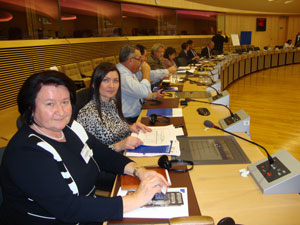 |
|---|
| Egle Šleinotiene and Lina Simanoniene. |
Lina Simanoniene, administrator-secretary UAB Naujasis nevežis (Lithuania):
- The business meeting and conference Languages for SME’s in Brussels provided an opportunity to look at language knowledge and learning from quite a different angle. It has become evident that small and medium-sized enterprises should make use of this as one the main factors of competitiveness in planning the development of their business globally.
Naturally, language learning is a long process but good and profitable investment in the future. During the conference and business meetings I understood that language learning is not word learning alone. It is very important to coordinate foreign language learning with studies of the history and culture of the foreign country.
This new attitude to the importance of a foreign language for business development helped me have a better understanding of the necessity for life long learning of languages.
Good mood and atmosphere of the conference left indelible impressions on me and laid the basis for developing a language learning strategy in the company I represent, i.e. UAB Naujasis Nevėžis (Lithuania).
Eglė Šleinotienė, President Lietuvos kalbų pedagogų asociacija:
- Increasing immigration, mobility, global marketing and trade need to be addressed by educational systems in the three Baltic States. In Lithuania we do a lot to teach for multicultural understanding in multicultural environment, as well we think about our own culture, nation and try to promote the Lithuanian language. Multilingualism expands and promotes diversity, understanding and appreciation of the new languages of the united and diverse Europe. For small nations it is vital to learn English, German and French, but it is not enough. English may be the language of business throughout the world, but we miss a lot if we do not use the local language and do not think about languages of local minorities. Keeping one’s face, preserving identity is hard work. Less widely-used languages, languages of countries we have borders with, give access to information and knowledge of the world we face. Mastery of at least 2 languages is vital for Europe’s economic competitiveness and prosperity.
And what does real life look like in Lithuania? Ministry of Education and Science, most secondary schools, colleges and universities, adult learning institutions have developed their language policy and strategy. Numbers illustrate positive trends. In 2009/2010 61.9 % of secondary school pupils studied English, 7.4%- German, 1.8- French, 28.7% Russian, 0.02- Polish, 0.04% Italian, 0.06-Spanish and 0.03% other languages.
7.2% of our schools organise educational process in languages of local minorities. Each pupil in our secondary level on average studies 1.4 languages. But language teaching and learning at colleges and universities sometimes depend on the support of the management level of a faculty and the budget available. Adult and long life language learning systems are often influenced by financial situation in the country, usually during the recession less funds are available.
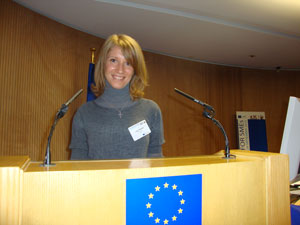 |
|---|
Julija Surikova, Head of the Language Research Department M.A.R.I.D.I Ltd.
(Latvia):
- Preparing for the conference “Languages for SME’s” in Brussels, on the 23rd and 24th of September, honestly I did not know what to expect from this event and what knowledge I would gain there. I must confess I was surprised by the results, which were achieved in the run of the conference. The outcomes exceeded my expectations.
The main burden of the conference is the idea of learning foreign languages and the acquaintance with cultures, as languages are the tools, which allow to maintain successful business outside the country you live in, communicate effectively with business partners, and build long life business relationship. To be successful in export is possible with the knowledge of the language and the traditions of the country you are going to work in.
The conference was a good platform for the SME’s representatives to exchange their experience of new markets entries, to share their viewpoints on the educational systems of the EU countries, in particular, learning foreign languages in secondary and vocational schools and universities. The conference participants expressed their opinions on student exchange programs, and discussed possible ways of improving foreign languages learning in their countries.
A lot of attention was devoted to the necessity and topicality of the Chinese, Japanese and Russian languages learning by European citizens, as the newest trend in export development is towards China, Japan and Russia. On the grounds of these tendencies a big European market is opening for the company M.A.R.I.D.I. Now the company has the Chinese, Japanese and Russian languages learning software products for English speaking learners and is developing new languages for the Europeans.
It was important for me personally to realize what I can do for the country I live in and for the EU in general, in order to raise the language awareness among the youth and raise the awareness of the necessity of foreign languages learning from the early age. The idea, which I support, which I believe to be important and vital to implement into life in Latvia is learning two foreign languages at schools besides Latvian and Russian. There is the necessity to raise the language awareness among the youth, to learn foreign languages at the early age and to promote this idea among parents.
The main ideas discussed at the conference intervene with the company mission – learning languages and the knowledge of languages and cultures is the key for better communication among people. We are proud that we promote the improvement of mutual understanding among people and whole countries.
It is important to understand that we all do one mutual work, each at one’s own level: in the family, at work, in the country, in the European Union and in the world.
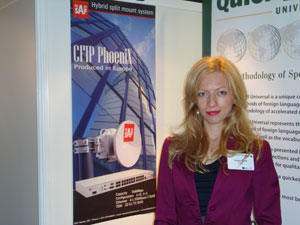 |
|---|
Kristine Ennite, the Senior Marketing manager of SAF Tehnika:
- The conference in Brussels intended to unite EU small and medium enterprises, educational institutions, and delegates of the European Commission to share knowledge of the role of languages in everyday business, as well as to discuss how the EC could help to improve the learning of languages in the EU.
As SAF Tehnika produces and exports the telecommunication equipment to almost 100 countries worldwide, languages are an important constituent of SAF Tehnika daily sales activities.
Thanks to the conference I learned many interesting ideas regarding the languages for business. But it is not only language that matters – it’s not enough to speak the language – you have to be able to sell in this language. Therefore, such aspects as knowledge of history, culture, mentality etc. are important to have successful sales in any country. For example, one Finnish company hires immigrants who are mostly considered to have “the wrong name” for work, but for exporting company they actually have “the right name”, as they know not only the language but also the social and historical background of the target country.
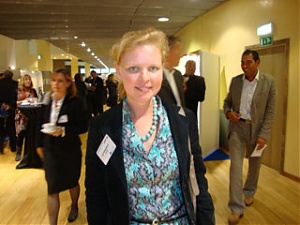 |
|---|
Olga Borodankova, Educational Policy and Systems Analyst; Education, Audiovisual and Culture Executive Agency (EACEA) of the European Commission, Eurydice Unit:
Having a large working experience as a language teacher both in public and private sectors in Estonia, I found extremely interesting the initiative of the European Commission to unite in one event educational authorities and SME representatives.
The meeting showed the need of collaboration between these two groups in order to promote language learning for business and thus create more employability and boost professional mobility within European citizens. I highly appreciated the common idea of all the participants despite of their various backgrounds of bringing together in one topic the issues of work, languages, culture and education.
My previous job as a teacher and what I have learned as an education system analyst in Eurydice (Eurydice Network provides information on and analyses of European education systems and policies) lead me to conclude that it is important to focus both on the development of language skills in all educational levels and professional fields as well as on teachers' education and continuous training to guarantee the quality of language learning in Europe.
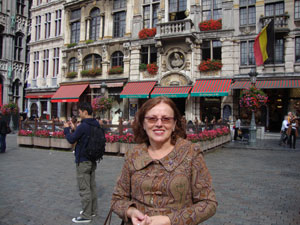 |
|---|
Olga Pavuk, Editor-in-Chief and Publisher of the international internet-magazine Baltic-course.com (Latvia):
The thesis about multilingualism of websites of the companies operating in foreign markets as a key factor for development of international business deserves a special mention. I like the example given by Professor from the University of Wales, about the companies, which have two English-language versions of their websites – one in the Queen’s English and the other in the simplified form of the international English.
It is very important for promotion of products to make the right choice of the name for a company intending to operate on foreign markets, i.e., the trade mark should be harmonious and understandable in different languages, and this was underlined also during the seminar in Brussels.
I approve of the discussion during the seminar about the European Commission participating in the lobbying for the issues concerning financing of education in the EU member states and the priorities of investing in youth and promoting mobility of students and young researchers. The new ERASMUS project for foreign language training of representatives of small and medium-sized enterprises is also interesting.








 «The Baltic Course» Is Sold and Stays in Business!
«The Baltic Course» Is Sold and Stays in Business!

